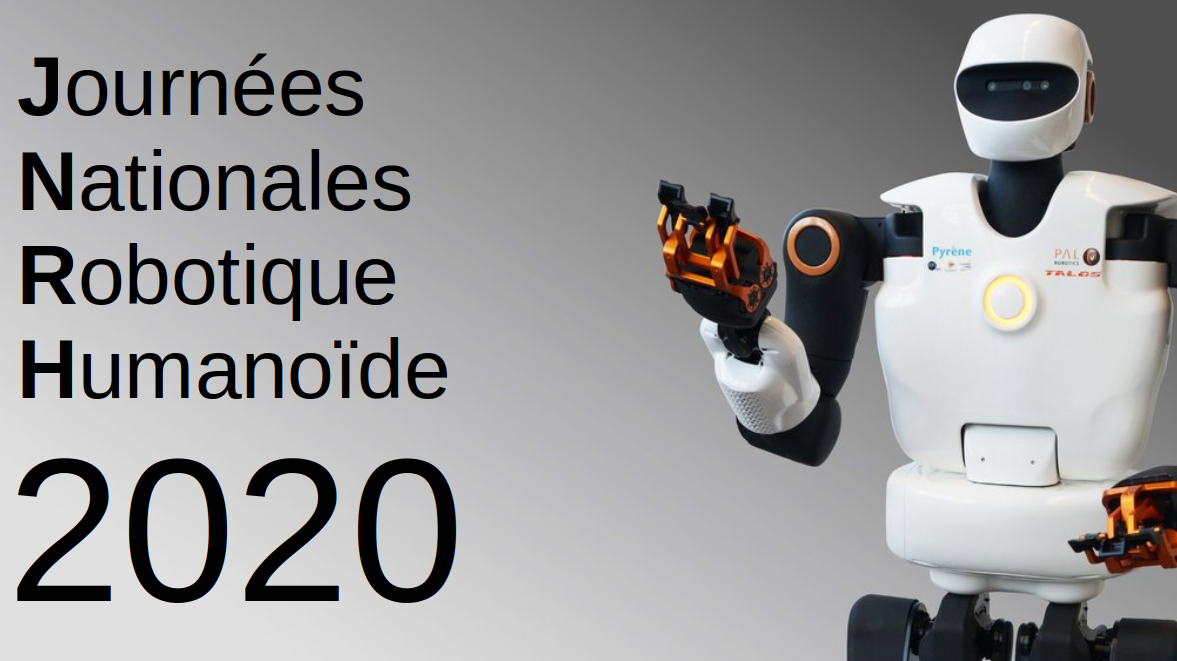A look back at the National Days of Humanoid Robotics Research 2020
Date:
Changed on 09/07/2021

The National Days of Humanoid Robotics Research (abbreviated to JNRH, in French) took place on 25 and 26 June, and were organised by the Auctus[[1] project team at Inria Bordeaux – Sud-Ouest, together with one of the Robotics[2] research consortium's promotional teams. The current public-health crisis forced the organisers to come up with a unique – virtual – format for the event, so that the social-distancing requirements imposed by the COVID-19 pandemic could be observed. Over the course of the two days, participants were able to choose from around 20 presentations. These included “invited lectures”, such as the one given by Christian Duriez, of the DEFROST project team (based at the Inria Lille – Nord-Europe Research Centre), which opened up the discussion beyond humanoid robotics, as well as local input from the Rhoban team at the University of Bordeaux. More information on all of these presentations is available on the event website.
The aim of these National Days is to bring together members of the national community engaged in robotics research, both academic and industrial, to discuss the scientific challenges of humanoid robotics. These challenges revolve around: mechanical and mechatronic design, modelling, control, digital optimisation, planning, perception, artificial intelligence, movement analysis, etc.
These gatherings also help promote the ideas of scientists involved in humanoid robotics to their counterparts in the life sciences, particularly in the areas of biomechanics and neuroscience, thus adding to the knowledge of both communities and facilitating the sharing of results. In fact, this crossover between disciplines and sharing of research is one of the key advantages of the field of robotics research.
This annual event is clearly an important one for the scientific community, particularly for doctoral and post-doctoral researchers. The organisers therefore had to call on all their ingenuity to ensure it could still go ahead this year, given the health and hygiene conditions in place. The meetings were hosted on a dedicated server at LAAS[3] and were able to be streamed live online using BigBlueButton. “One of the benefits of this format is that we could accommodate 80 registered participants (simultaneous online attendance reached a peak of 70 over the two days), which is not possible on site at present,” Vincent Padois explained. “Furthermore, leaving aside the current situation, when it comes to this type of meeting, members of the community are increasingly reluctant to make a journey that is costly in terms of time, money and damage to the environment. On the other hand, there are those who don't want to take part in this type of ‘remote’ event, as it lacks one of the most important elements: time to socialise (eating or taking coffee-breaks together, etc.), which is when many informal exchanges take place.
In the future, depending on the health situation, I think it would be a good idea to offer a ‘hybrid’ format, whereby there is a face-to-face element but also a live streaming option, which should keep everyone happy.”
[1] Auctus is one of the project teams at the Inria Bordeaux – Sud-Ouest Research Centre. It is run in partnership with the IMS (Material to Systems Integration) laboratory and hosted at the ENSC (the Bordeaux INP engineering school).
[2] The French Research Robotics Network (GDR Robotique) was set up by the CNRS (French National Centre for Scientific Research) in 2007. The consortium’s working group no.7, “Humanoid robotics”, coordinates the arrangements for this event.